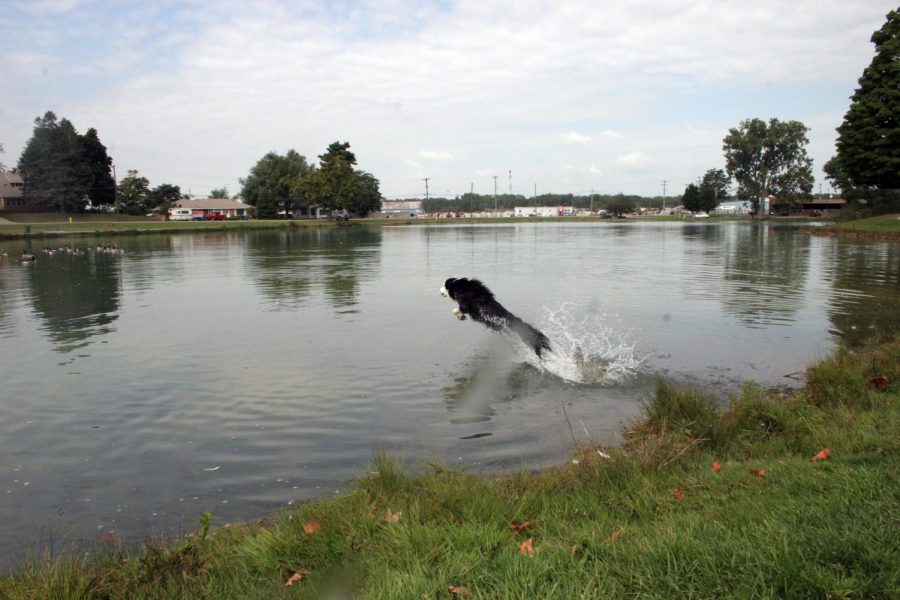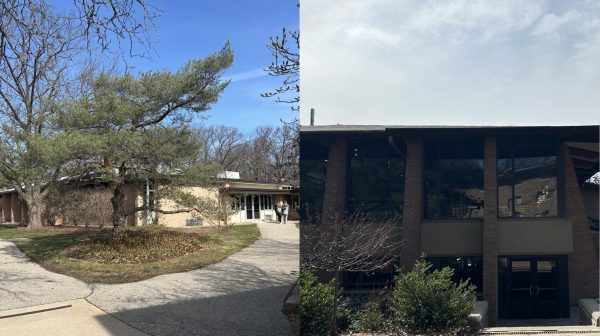Goose Control rids Calvin’s campus of pesky geese
photo courtesy of Theresa Villarreal
One of goose control’s border collies chases after distant geese.
Why aren’t there geese on Calvin’s campus? Grounds Manager Geoffrey Van Berkel explained, “Adult geese can also become aggressive when guarding their young.” They prove dangerous to students and children who frequent the Seminary Pond. The answer is Goose Control of West Michigan. According to Van Berkel, Calvin had approximately 90 returning geese each spring, and “Calvin started performing Canada Goose hazing techniques to move resident geese off-site in response to sanitary concerns and defoliation of landscape, particularly at the Seminary Pond and Lower Soccer fields.” Theresa Villarreal, the founder of Goose Control of West Michigan, was contacted by Calvin in 2007 after the institution first contacted her sister in Detroit, who has been in the goose control business for over 20 years. The job started as a part-time job because Calvin had their own border collie, Cali, for goose control. According to Van Berkel, after eight years of Calvin using their own border collie, Goose Control of West Michigan was brought on full-time.
The species of Canadian Geese found on Calvin’s campus is classified as endangered and is protected. Van Berkel explains that in order to control the geese, Calvin has to be licensed with both the United States Department of Agriculture and the Michigan Department of Natural Resources. The Michigan Department of Environmental Quality also regulates goose control in the state and allows specially trained border collies to rid properties of geese without harming them. As Van Berkel states, “The idea behind hazing is that the geese are uncomfortable staying and raising a family in the area where the border collies frequent, so they find other more suitable locations away from the dogs.” Villarreal’s three border collies, Rolo, Bruno and Corry, are natural predators of the birds. The goal of goose control is to train the birds to consistently expect predators at their current, unwanted location. Using the dogs as predatory animals trains the birds not to come onto the property anymore.
Other goals of goose control are minimizing goose migration to the site and preventing new geese from nesting. From March to May, the geese migrate north and nest. In order to prevent nesting and new geese, goose families have to be relocated in June. Businesses and universities have to get a DNR permit before June in order to relocate families. The Canadian Geese are federally protected, so no harm is done to the birds.
The only physical contact with the geese is during June, when goslings have to be picked up and transported to a reserve in DNR-approved travel containers. As Van Berkel further explains, “[Calvin is] also permitted to perform goose roundup — where the geese are humanely captured during molting and transported to the Allegan State Game Area, where they are released back into the wild.” According to Van Berkel and Villarreal, geese always return to the place they learn to fly, so transporting them before they molt will keep the young geese from returning to Calvin. Van Berkel states that large populations of geese no longer return to Calvin’s campus, and geese minimally frequent campus. Goose control on campus emphasizes removing new families of geese in the spring.
Current goose locations around campus include the Seminary Pond, the Prince Conference Center pond and the Nature Preserve ponds. But the Nature Preserve is free of the goose control methods, as Van Berkel explains: “We do have some goose families that nest and raise young in the Nature Preserve ponds behind the Youngsma building, but they rarely will cause issues, and we like to keep them there in their natural environment.”







